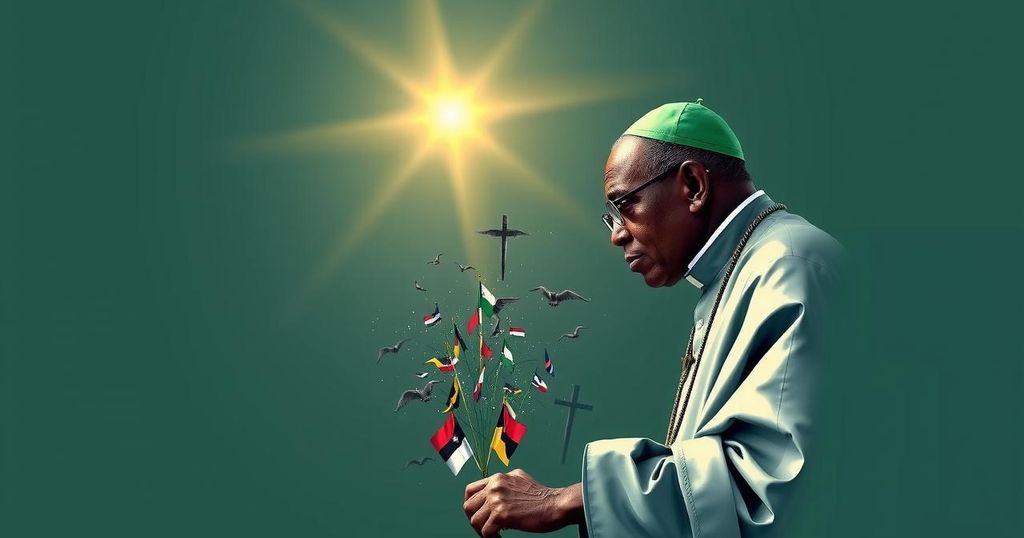Cardinal Mulla: Synodality as a Pathway to Peace in South Sudan

Cardinal Stephen Ameyu Mulla asserts that pragmatic synodality is pivotal for peace in South Sudan, emphasizing the importance of collective dialogue to address the country’s ongoing challenges. He reflects on the significant historical and contemporary struggles faced since independence, urging bishops and politicians alike to engage in meaningful conversation and uphold peace agreements brokered by the Vatican. The cardinal highlights the dual crises of growth in the Church juxtaposed with political regression, calling for transformative dialogue as a means of resolving ongoing issues.
At a recent press conference in Rome, Cardinal Stephen Ameyu Mulla of the Archdiocese of Juba, South Sudan, articulated his belief that pragmatic synodality could serve as an effective approach toward achieving peace in South Sudan, particularly within the context of a fractured episcopal conference. Cardinal Mulla emphasized that “the synod journey helps us the Church to resolve many problems together” and that synodality, which embodies the concept of moving forward collectively, is critical in the quest for tranquility in a nation deeply affected by conflict. Recognizing the intricate challenges faced by both South Sudan and its northern neighbor, Sudan, Cardinal Mulla expressed hope that the Church’s commitment to prayerful dialogue and reflection could foster significant change. “The synod journey helps us together to resolve many human problems,” he noted. He further emphasized the unity between South Sudanese and Sudanese bishops within a single bishops’ conference while acknowledging the ongoing tension stemming from historical conflicts and current struggles. Despite gaining independence from Sudan in 2011, South Sudan has experienced escalating issues, including difficulties with the revitalized peace agreement. Mulla recalled the 2018 papal audience that facilitated a peace deal between South Sudan’s president and opposition leader, remarking that little progress has been made since their return from Rome. “As a result, the country is still unstable. We continue to insist as bishops that this revitalized peace agreement should be implemented by the letter,” he asserted. He described the Church as growing despite the state regressing, underscoring that many South Sudanese continue to suffer amid ongoing strife, such as in Sudan where brutal conflicts have displaced millions. Cardinal Mulla lamented the humanitarian crises inflicted by war and emphasized that “we’re suffering [because of] people who want power but not service.” Conclusively, he reiterated the importance of dialogue in resolving both ecclesiastical and political challenges, positing that synodality provides a path forward to overcoming the myriad issues facing South Sudan today. “,”background”:”The article discusses the remarks made by Cardinal Stephen Ameyu Mulla regarding synodality as a means of achieving peace in South Sudan, a country struggling with the aftermath of civil conflict. Cardinal Mulla highlights the importance of communal dialogue within the Church and among the South Sudanese populace to address the enduring issues following the nation’s independence from Sudan in 2011. The backdrop includes ongoing violence and instability that impact both South Sudan and the region, particularly the conflict in Sudan, which has further complicated the humanitarian situation. Cardinal Mulla’s insights underscore the need for cooperative engagement to foster understanding and peace in a context heavily influenced by past and present discord. The article also references efforts made by the Vatican to mediate peace in the region, emphasizing the precarious nature of these agreements and the need for sustained commitment from leaders to uphold them.
In summary, Cardinal Stephen Ameyu Mulla stresses the importance of synodality as a pathway to peace in South Sudan. His comments reflect an urgent need for dialogue and collaborative efforts within the Church and the broader society to address the problems that have persisted since the nation’s independence and ongoing conflicts. The cardinal’s advocacy for the proper implementation of the revitalized peace agreement reveals a commitment to finding lasting solutions to the turmoil affecting both South Sudan and neighboring Sudan. The call to serve rather than to rule underscores a moral imperative for leaders and politicians.
Original Source: www.pillarcatholic.com








